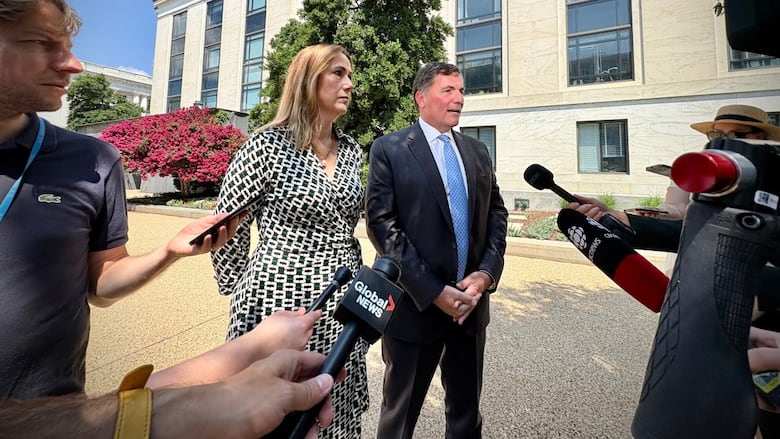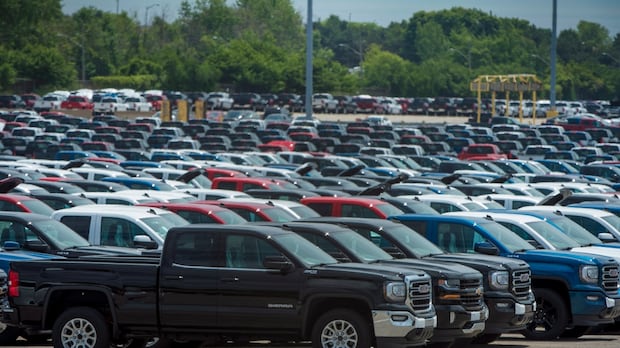Viable trade deal wasn't on the table ahead of deadline, Canada-U.S. trade minister says
Business groups raise concerns but say 'no deal is better than a bad deal'

The federal minister responsible for Canada-U.S. trade says Canada won't accept a bad deal from the U.S. President Donald Trump's administration and that there had been no viable deal on the table this week.
Minister Dominic LeBlanc told Radio-Canada's Canada Midi that he was encouraged because the United States is still open to trade talks but said the negotiations are "complex."
"We have always said that we would not accept just any agreement. We would accept an agreement that was in the interests of workers in the Canadian economy. And at the end of the day, yesterday, that agreement was not yet in sight," LeBlanc told host Laurence Martin in a French interview.
LeBlanc's comments come after the two countries failed to come to some sort of agreement by an Aug. 1 deadline.
U.S. President Donald Trump signed an executive order on Thursday boosting tariffs from 25 per cent to 35 per cent on Canadian goods that don't comply with the Canada-U.S.-Mexico Agreement (CUSMA).
In addition to the 35 per cent tariffs on non-CUSMA compliant goods, Trump has also slapped a 25 per cent levy on the non-U.S. portion of assembled vehicles. The U.S. has also imposed 50 per cent tariffs on steel and aluminum imports from all countries.
LeBlanc suggested that the sector-specific tariffs could be a sticking point in the negotiations, noting Canada is keen to protect those industries.
LeBlanc has been meeting with U.S. officials in Washington in recent weeks. His office told CBC News that he had no meetings in Washington on Friday and that he would be returning to Canada later in the day — although the minister later said he expects to speak with U.S. Commerce Secretary Howard Lutnick next week.
Two groups representing businesses in Ontario and Michigan are urging Canada and the U.S. to get a trade deal done in order to avoid prolonged instability.
"Prolonged instability could have serious consequences for key sectors, from automotive and advanced manufacturing to agriculture and logistics," a joint statement on Friday from the Ontario and Michigan chambers of commerce said.
"This is not just a trade story, it's a North American competitiveness crisis. The chambers are calling on both governments to return to the negotiating table."
Michigan and Ontario form one of the largest trade corridors between the two countries. The two jurisdictions are largely connected via the integrated auto sector.
Prime Minister Mark Carney released a statement just after midnight on Friday saying Canada will continue to work toward a deal while focusing on providing supports for impacted industry and diversifying trade.
"Canada will be our own best customer, creating well-paying careers at home, as we strengthen and diversify our trading partnerships," the statement said.
Trump's order cites "Canada's lack of co-operation in stemming the flood of fentanyl and other illicit drugs across our northern border" — even though Canada accounts for a small percentage of drug seizures entering the U.S.
But a White House official gave CBC News a different explanation for the lack of an agreement with Canada, saying on background that Canada "has repeatedly demonstrated a lack of seriousness in trade discussions as it relates to removing trade barriers."
Trump gave Mexico, which accounts for the majority of drug seizures at the U.S. border, a 90-day extension of its current tariff regime with the goal of signing a new deal during that period.
'No deal is better than a bad deal'
Other Canadian business groups also expressed concerns about the lack of an agreement but say it's better that Canada take its time rather than accept a bad deal.
The Canadian Chamber of Commerce said it believes that spending a little bit more time on crafting the right deal is well worth the wait because it will deliver lasting benefits.
However, the group said it also feels businesses in Canada and the U.S. urgently need more certainty.
Dan Kelly, president and CEO of the Canadian Federation of Independent Business (CFIB), blasted the U.S. administration for its tariff rationale.
"The hike in U.S. tariffs to 35 per cent will harm small businesses on both sides of the border. The fentanyl rationale is even more ridiculous than the decision itself," Kelly said in a statement.
"CFIB supports the view that no deal is better than a bad deal, but the lack of resolution means small firms will not be able to plan for the future or continue to put off difficult choices."
Kelly's sentiment was echoed by the United Steelworkers union on Friday.
"While we're disappointed an agreement wasn't reached to end this trade war, the worst outcome would have been a deal that locked in permanent damage to our economy," national director Marty Warren said in a statement.
Warren encouraged Ottawa to take retaliatory action if necessary.
"This fight is far from over. The federal government must remain steadfast to secure the right deal for the Canadian economy and Canadian workers and must not accept anything less."
Conservative Leader Pierre Poilievre said in a statement on Friday that he is ready to work with the government to help secure a good deal for Canada.
"We stand united with all workers facing devastation from unjustified tariffs on steel, aluminum, softwood, auto and agriculture. These deeply misguided policies will hurt families and businesses on both sides of the border," he said.
Premiers urge Ottawa to stand its ground
Ontario Premier Doug Ford called the tariff increase concerning and said Ottawa should retaliate with 50 per cent tariffs on U.S. steel and aluminum.
"Canada shouldn't settle for anything less than the right deal," Ford said on the social media platform X on Thursday night. "Now is not the time to roll over. We need to stand our ground."
Quebec Premier François Legault called Trump's latest move "disappointing" and argued that it will hurt Americans.
"Recent events highlight the importance we must place on diversifying our markets and increasing our economic autonomy," Legault wrote on X in French.
"We are in contact with the federal government and other provinces regarding the next steps. Discussions with the American administration must continue. In any case, we will defend the interests of Quebecers."
New Brunswick Premier Susan Holt said Canada should still push for a good deal.
"Canada has what the world wants, and we should not settle for anything less than the best deal for New Brunswickers," she wrote Friday on X.
"Canada is coming together like never before to support our local businesses, workers and build a strong and resilient economy. We have your back."
Alberta Premier Danielle Smith said the tariffs "weaken one of the most important trade and security alliances in the world." She urged the federal government to continue talks but also called for Ottawa to repeal laws she says hurt Canada's economy.
"I urge the federal government to continue negotiating to resolve these tariff issues and restore a free and fair trade agreement with the United States, while diversifying and strengthening the Canadian economy by unleashing our world-class natural resource sector," Smith said in a news release on Friday.
Saskatchewan Premier Scott Moe disagreed with some of his counterparts and called on the federal government to lower or remove counter-tariffs placed on U.S. goods.
"I think if we're serious about achieving a renewed and revamped and enhanced trade environment ... somebody's going to have to move in this space, and we would suggest that it should be Canada," Moe told reporters Friday.
Nova Scotia Premier Tim Houston said Friday that he's "putting faith in the prime minister and his team that will get to the right deal for Canada.
"We don't want to rush into a bad deal that we're stuck with. We know there's a lot of volatility with the administration, with the president. So it's hard to say what will stand anyway," Houston told CBC News. "We have to stand up for Canada."
With files from Katie Simpson, Karsten Green and The Canadian Press





